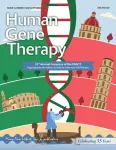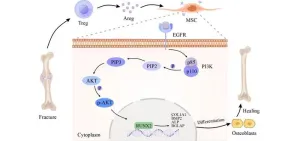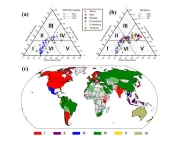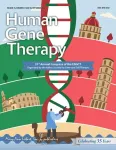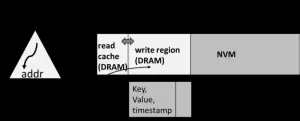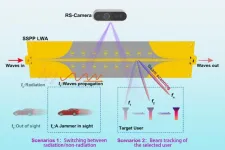RNA template-based targeted gene editing in mammalian cells
2024-08-30
A new article in the peer-reviewed journal Human Gene Therapy describes the consensus reached by invited experts who participated in a meeting to evaluate the potential carcinogenicity of gene therapies. Click here to read the article now.
The participants discuss the definition of vector genotoxicity, sources of uncertainty, suitable toxicological endpoints for genotoxic assessment of gene therapies, and future research needs. The proposed recommendations will help guide the development of regulatory guidelines for the non-clinical toxicological assessment of gene therapy products.
J­an ...
What a submerged ancient bridge discovered in a Spanish cave reveals about early human settlement
2024-08-30
Media Contact:
John Dudley
(814) 490-3290 (cell)
jjdudley@usf.edu
EMBARGOED FOR RELEASE UNTIL 5 A.M. ET ON AUG. 30, 2024
What a submerged ancient bridge discovered in a Spanish cave reveals about early human settlement
Led by a USF geologist, a team of researchers examined a submerged 25-foot bridge to tackle a long-lasting archaeological controversy: When humans settled on the islands in the western Mediterranean. Their findings narrow a historical gap between the settlement timelines of the eastern and western Mediterranean regions.
TAMPA, Fla. (Aug. 27, 2024) – A new study led by the University ...
AI tool maps out cell metabolism with precision
2024-08-30
Understanding how cells process nutrients and produce energy - collectively known as metabolism - is essential in biology. However, analyzing the vast amounts of data on cellular processes to determine metabolic states is a complex task.
Modern biology generates large datasets on various cellular activities. These "omics" datasets provide insights into different cellular functions, such as gene activity and protein levels. However, integrating and making sense of these datasets to understand cell metabolism is challenging.
Kinetic models offer a way to decode this complexity by providing mathematical representations of cellular metabolism. ...
The BMJ launches special collection examining women’s health in China
2024-08-30
Women in China are now healthier than ever, but as the economy grows and China’s culture becomes more westernised, the country faces new challenges due to changing social norms and expectations, say experts in a special collection of articles published by The BMJ today.
In nine articles spanning topics and conditions across women’s life courses, experts from China analyse the current state of women’s health; review achievements and remaining challenges in the contexts of women’s empowerment and rights, labour force participation, and family and community dynamics; and make recommendations ...
Study: Transparency is often lacking in datasets used to train large language models
2024-08-30
CAMBRDIGE, MA – In order to train more powerful large language models, researchers use vast dataset collections that blend diverse data from thousands of web sources.
But as these datasets are combined and recombined into multiple collections, important information about their origins and restrictions on how they can be used are often lost or confounded in the shuffle.
Not only does this raise legal and ethical concerns, it can also damage a model’s performance. For instance, if a dataset is miscategorized, someone training a machine-learning model for a certain task may end up unwittingly using data that are not designed for that task.
In addition, data from unknown sources ...
New ESC Hypertension Guidelines recommend intensified BP targets and introduce a novel elevated blood pressure category to better identify people at risk for heart attack and stroke
2024-08-30
London, UK, 30 August 2024: Updated ESC Guidelines on the management of elevated blood pressure and hypertension include a new elevated blood pressure category, more ambitious and intensive treatment targets, and, for the first time, recommendations on the use of renal denervation to treat various forms of hypertension. The Guidelines have been produced by an international panel of experts that include co-Chairpersons Professor Bill McEvoy of the University of Galway, Ireland, and Professor Rhian Touyz of McGill University, Canada.
Elevated blood pressure and hypertension are by far the most common and important risk ...
New ESC Guidelines combine peripheral arterial and aortic diseases for first time, emphasising interconnectivity of whole arterial system
2024-08-30
London, UK, 30 August 2024: The 2024 ESC Guidelines for the management of peripheral arterial and aortic diseases (PAAD) evaluate these vascular diseases together as part of same cardiovascular system, appreciating that patients with aortic diseases are at risk of having peripheral vascular diseases and vice versa. The Guidelines are aimed at cardiologists, but were coordinated for alignment with guidelines for surgeons by EACTS and endorsed by VASCERN and ESVM.
“These updated guidelines have been introduced now due to significant advancements and shifts in our understanding and management of aortic and peripheral ...
New Chronic Coronary Syndrome (CCS) Guidelines expand diagnostic tools and ways to prevent major adverse events and enhance quality of life
2024-08-30
London, UK, 30 August 2024: The 2024 ESC Guidelines on the management of chronic coronary syndromes (CCS) include a focus on both larger and smaller blood vessels of the heart; new models to estimate chances of blocked large arteries (so-called obstructive coronary artery disease); optimal selection and sequence of tests; drugs and interventions to prevent disease complications and improve symptoms, and the fundamental role of patient involvement.
“The new guidelines prompt cardiologists to rethink chronic coronary syndromes ...
Atrial fibrillation guidelines focus on shared and equal care, patient empowerment, comorbidities, evidence-based management and dynamic re-evaluation
2024-08-30
London, UK, 30 August 2024: The 2024 ESC Guidelines for the management of atrial fibrillation, developed in collaboration with the European Association of Cardio-Thoracic Surgery (EACTS), contain a number of new approaches and treatment-specific recommendations to help manage the surging numbers of patients with AF worldwide.
“Atrial fibrillation (AF) is one of the most commonly encountered heart conditions, with a broad impact on all health services across primary, secondary and tertiary care,” says Guidelines Chair Professor Isabelle C. Van Gelder, University Medical Centre Groningen, Groningen, The Netherlands. “The prevalence ...
Two thirds of deaths related to high BMI are due to cardiovascular diseases - ESC Clinical Consensus Statement on Obesity and Cardiovascular Disease
2024-08-30
London, United Kingdom – 30 August 2024: The ESC Clinical Consensus Statement on Obesity and Cardiovascular Disease, presented at this year’s ESC Congress (London, UK, 30 August to 2 September) summarises current evidence on the epidemiology and aetiology of obesity; the interplay between obesity, cardiovascular risk factors and cardiac conditions; the clinical management of patients with cardiac disease and obesity; and weight loss strategies including lifestyle changes, interventional procedures, and anti-obesity medications with particular focus ...
Prehospital pulse-dose glucocorticoid in ST-segment elevation myocardial infarction
2024-08-30
About The Study: In patients with ST-segment elevation myocardial infarction, treatment with prehospital pulse-dose glucocorticoid did not reduce final infarct size after 3 months. However, the trial was likely underpowered as the final infarct size was smaller than anticipated. The glucocorticoid group had improved acute parameters compared with placebo.
Corresponding Author: To contact the corresponding author, Jasmine Melissa Madsen, MD, email jasmine.melissa.madsen.01@regionh.dk.
To access the embargoed study: Visit our For The Media website at this link https://media.jamanetwork.com/
(doi:10.1001/jamacardio.2024.2298)
Editor’s ...
Effects of sacubitril/valsartan on all-cause hospitalizations in heart failure
2024-08-30
About The Study: In this post hoc pooled analysis of 13,194 patients with chronic heart failure (HF) in the PARADIGM-HF and PARAGON-HF randomized clinical trials, sacubitril/valsartan significantly reduced hospitalization for any reason, with benefits most apparent in patients with a left ventricular ejection fraction below normal. This reduction appeared to be principally driven by lower rates of cardiac and pulmonary hospitalizations.
Corresponding Author: To contact the corresponding author, Muthiah Vaduganathan, MD, MPH, email mvaduganathan@bwh.harvard.edu.
To ...
Promising antibiotic candidates discovered in microbes deep in the Arctic Sea
2024-08-30
Antibiotics are the linchpin of modern medicine: without them, anyone with open wounds or needing to undergo surgery would be at constant risk of dangerous infections. Yet we continue to face a global antibiotics crisis, as more and more resistant strains of bacteria are evolving, while the rate of discovery of fundamentally new antibiotics has been much slower.
But there is reason for hope: 70% of all currently licensed antibiotics have been derived from actinobacteria in the soil, and most environments on Earth have not yet ...
A distinct “repair” role of regulatory T cells in fracture healing
2024-08-30
The study uncovers a unique reparative function of regulatory T cells (Tregs) in the process of fracture healing, a discovery that adds a new dimension to our understanding of the immune response in tissue regeneration. Tregs, a subset of T cells known for their role in maintaining immune tolerance and preventing autoimmunity, are now shown to play a critical part in the intricate interplay between the immune system and bone repair.
Fracture healing is a complex process that involves a sequence of events, including inflammation, repair, and remodeling. While the initial ...
Dancing galaxies make a monster at the cosmic dawn
2024-08-30
Astronomers have spotted a pair of galaxies in the act of merging 12.8 billion years ago. The characteristics of these galaxies indicate that the merger will form a monster galaxy, one of the brightest types of objects in the Universe. These results are important for understanding the early evolution of galaxies and black holes in the early Universe.
Quasars are bright objects powered by matter falling into a supermassive black hole at the center of a galaxy in the early Universe. The most accepted theory is that when two gas-rich galaxies merge to form a single larger galaxy, the gravitational interaction of the two galaxies causes gas to fall towards the supermassive ...
Drought risk and awareness gaps in global society
2024-08-30
Natural disasters have threatened to human beings and the ecosystem. Among the various natural disasters, drought is one of the most insidious and costliest, adversely affecting the global economy and livelihoods. Unlike sudden disasters such as earthquakes or hurricanes, drought is a slow-onset phenomenon that gradually intensifies. This prolonged nature of drought often results in the shortage of drinking water and the disruption of local economies.
The Slow Onset and Impact of Drought
Drought creeps in gradually, often going unnoticed until it reaches a critical stage. This slow progression makes drought particularly challenging to manage and mitigate. Initially, ...
UAF scientist’s method could give months’ warning of major earthquakes
2024-08-30
The public could have days or months of warning about a major earthquake through identification of prior low-level tectonic unrest over large areas, according to research by a University of Alaska Fairbanks scientist who analyzed two major quakes in Alaska and California.
The work was led by research assistant professor Társilo Girona of the UAF Geophysical Institute.
Girona, a geophysicist and data scientist, studies precursory activity of volcanic eruptions and earthquakes. Geologist Kyriaki Drymoni of the Ludwig-Maximilians-Universität in Munich, Germany, is a co-author.
The ...
Consensus paper: Carcinogenicity of gene therapies
2024-08-30
Researchers from the University of Pennsylvania, Perelman School of Medicine, Gene Therapy Program, and Moderna, have shown that repeated administration of lipid nanoparticle-encapsulated mRNA therapy significantly extended survival and reduced serum leucine levels in a mouse model of maple syrup urine disease (MSUD). Click here to read the article now.
The researchers, led by James Wilson, MD, PhD, from the University of Pennsylvania, Perelman School of Medicine, evaluated a lipid nanoparticle-based treatment approach to address all possible genetic mutations that can cause MSUD.
“Repeated intravenous delivery ...
HeterMM: Applying in-DRAM index to heterogeneous memory-based key-value stores
2024-08-30
Emerging byte-addressable storage technologies, such as NVM, provide a more cost-effective and larger-capacity alternative to DRAM, presenting new opportunities to address the high cost, limited capacity, and volatility of in-memory key-value (KV) stores. Numerous efforts have been dedicated to redesigning conventional structures on NVM. However, they were challenged by the substantial engineering cost and increased complexity to be integrated into existing systems. Thus, a general framework to apply existing indexes to KV stores on NVM becomes more attractive.
To solve the problems, a research team led by Xuan Zhou published their new research on ...
Several advantages when medical abortion is started at home
2024-08-30
Being at home is as safe as at the hospital when a medical abortion after twelve weeks of pregnancy is initiated. These are the findings of a study conducted at the University of Gothenburg. When starting at home, day patient care is usually sufficient, and women are satisfied with the treatment.
In the case of medical abortion up to and including the tenth week of pregnancy, the procedure used is a so-called home abortion. At ten to twelve weeks, day patient care is most commonly used, while s medical abortion after twelve ...
Northwestern receives $55 million to advance health research
2024-08-30
Funding will enable discoveries for diverse populations to go from lab to clinical care settings
Will translate scientific research to treatments, therapies that can improve patients’ quality of life
Institute will infuse implementation-science methods into research to make public health improvements more scalable
‘Clinical and translational research does not happen in a bubble’
CHICAGO --- The Northwestern University Clinical and Translational Sciences (NUCATS) Institute has received $55 million in National Institutes of Health (NIH) funding to accelerate the development, evaluation and implementation of improved health care interventions.
The seven-year ...
The Lancet: Managing early stages of abortion care at home after 12 weeks of pregnancy is safe and reduces time spent in hospital, study finds
2024-08-30
The Lancet: Managing early stages of abortion care at home after 12 weeks of pregnancy is safe and reduces time spent in hospital, study finds
A randomised controlled trial of 435 women having a medical abortion after 12 weeks of pregnancy found 71% of patients who took the first dose of misoprostol at home spent fewer than 9 hours in hospital, compared to 46% of patients who took the first dose of misoprostol at hospital.
There was no difference in safety outcomes observed between the two groups, however, of the women who took the first ...
Billions worldwide consume inadequate levels of micronutrients critical to human health
2024-08-30
Embargoed for release: Thursday, August 29, 6:30 PM ET
Key points:
More than half of the global population consumes inadequate levels of several micronutrients essential to health, including calcium, iron, and vitamins C and E, according to new estimations.
Micronutrient inadequacies may be more severe than previously thought and may differ between males and females.
The results provide a roadmap for taking action by showing which population groups are at risk of deficiency for specific nutrients.
Boston, MA—More than half of the global population consumes inadequate levels of several micronutrients essential to health, including calcium, iron, and vitamins C and ...
Lack of competition between petrol stations hits households most in poorest areas
2024-08-30
Households in low-income areas face significantly higher increases in petrol prices when rival fuel stations close compared to high-income areas, according to new research led by the University of East Anglia (UEA).
At the same time, low-income areas do not benefit from a higher drop in prices when new stations open.
The study is published today in the Journal of Industrial Economics. It shows that it matters who operates the petrol stations: large chains respond with higher price increases following the exit of one of their rivals.
Other factors, such as reliance on cars, commuting distance, age, or education also drive some of this ...
An externally perceivable smart leaky-wave antenna based on spoof surface plasmon polaritons
2024-08-30
A new publication from Opto-Electronic Advances; DOI 10.29026/oea.2024.240040, discusses an externally perceivable smart leaky-wave antenna based on spoof surface plasmon polaritons.
Smart antennas have garnered significant attention for their ability to enable both communication and perception functions simultaneously, commonly with complicated control and high cost though. The growth of the Internet of Things (IoT) and artificial intelligence (AI) has led to new applications across disciplines, and a range of flexible and miniaturized perceptive devices. Therefore, smart antennas that can ...
[1] ... [920]
[921]
[922]
[923]
[924]
[925]
[926]
[927]
928
[929]
[930]
[931]
[932]
[933]
[934]
[935]
[936]
... [8789]
Press-News.org - Free Press Release Distribution service.
